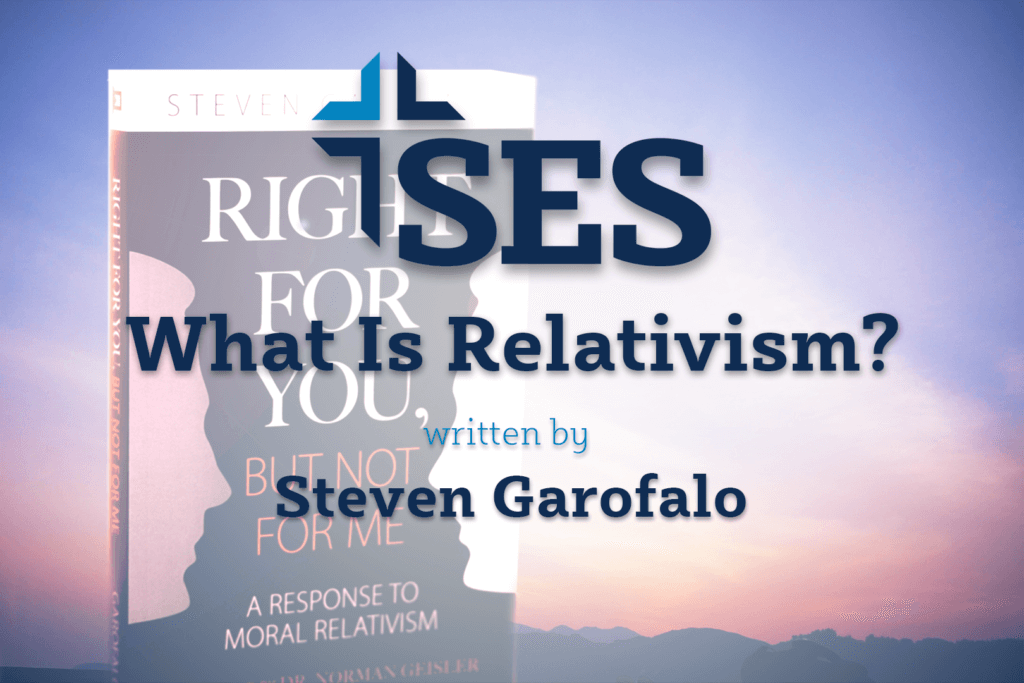[et_pb_section bb_built=”1″ admin_label=”section”][et_pb_row admin_label=”row”][et_pb_column type=”4_4″][et_pb_text admin_label=”Text” background_layout=”light” text_orientation=”left” use_border_color=”off” border_color=”#ffffff” border_style=”solid”]
The following article is taken in part from the book, Right For You, But Not For Me, A Response To Moral Relativism at the following link http://reasonfortruth.org/resources/books
The year was 1999, and I had just moved to Charlotte, N.C. from Washington, D.C. where I grew up. I joined the YMCA and one of the first people I met at the “Y” was a gentleman named Kent (not his real name). Kent was in his mid-50s and I in my mid-30s. He had heard I was a seminary student, so he immediately dubbed me “Preacher.”
Kent introduced himself as a gnostic and promptly asked me: “Do you know what a gnostic is?”
“I have a general idea,” I said. Then I kindly asked if he would allow me a couple of days to brush up on the term so we could have a constructive conversation.
“O.K.,” he said, with a tad of cynicism in his voice. “But I am going to hold you to it.”
My mother had always impressed on me the importance of keeping my word, so when I got home I started studying about Gnostics in detail. I made sure I understood the words gnostic and Gnosticism and any related terms that might come into play during our conversation. My goal was to be able to answer Kent’s question and have a discussion about why he was a gnostic and why he believed what he believed. Most important, I had to present myself as a knowledgeable Christian whom Kent would credit with being able to answer further questions about the hope that lies within me (1 Peter 3:15), in contrast to his beliefs in Gnosticism.
Two or three days later, Kent came up to me at the Y.
“So,” he said, his tall frame hovering over me, “Can you tell me what a gnostic is?”
I thanked him for being patient and for giving me the time to brush up on my terms. I went on to explain what a gnostic is, from an ancient perspective, and how that belief has evolved and is used in our modern era.
After a good discussion, I told Kent that I thought he was more of a skeptic than a gnostic, and to my surprise, he agreed. He held out his arm and shook my hand, and in a surprising manner said, he appreciated my doing my homework and having an intelligent conversation with him. Our discussion brought clarity to what he believed and removed a few simple obstacles between him and God. That day was the start of what became a 10-year conversation about God, Jesus, the Christian Scripture, and relativism. Kent argued that morality, Scripture, truth and even knowledge are relative. This led me to examine exactly what is meant by the term relativism and how it applied to various areas of thought, theology and life in general. Kent and I started at the most logical point in addressing the issue of knowing anything as either relative or absolute. If knowledge is relative, than there is not much if anything to talk about regarding God, our existence, or what it even means to be a Gnostic.
Epistemological Relativism
The first form of relativism Kent and I discussed was regarding knowledge. Is everything (presumptively) knowable relative? This is called epistemological relativism. Epistemology is the study of the nature and grounds of knowledge, especially with reference to its limits and validity. Epistemological relativism claims that truth cannot be found anywhere in human knowledge. Simply put, this view holds the position that truth cannot be known absolutely in areas such as science, archeology, philosophy, and theology. One’s position regarding epistemological relativism can be determined by asking if they can know with certainty if the world is round or flat. According to epistemological relativism, we cannot know that the world is round, despite all of the evidence, because truth cannot be found anywhere in human knowledge. Once we established that knowledge is knowable and not relative, we moved on to address reality itself as something relative or absolute. If reality is relative Kent and I agreed that we need to convert to Hinduism and accept the fact that we really do not exist as individual beings, and that life is like a motion picture, not reality. But we do exist and it was obvious to both Kent and I that knowledge is knowable on absolute terms and not something that is relative. This led us to redirect our conversation towards the issue of reality itself as something relative-or not. This is called metaphysical relativism.
Metaphysical Relativism
The second type of relativism we discussed was in relation to reality. Metaphysics is the study of ultimate reality. Metaphysical relativism claims that there are no absolutes anywhere in reality. A simple way to test metaphysical relativism is to ask someone if they exist or if they are real. If they say yes or no, then they admit with absolute certainty that truth can be known in reality. By acknowledging that we do in fact exist, we affirm that truth can be known in reality. Once Kent and I established that we do in fact exist in reality, we had to wrestle through the issue of what it means to act moral in our existence. This led us to a long discussion about morality as something defined by either individuals, culture possibly feelings, or God as the single Moral Standard Maker. The former is called moral relativism.
Moral Relativism
The third form of relativism we discussed was regarding the subject of morality. Moral relativism is the philosophical theory that all morality is relative. It holds to the belief that morality is not absolute or consistent for all people, but can be defined differently by different cultures, subcultures, and religions, according to experience, taste, and personal feelings. As a result, a particular behavior can be deemed right for you but not for me. As a result, moral relativism leads to the conclusion that morality is not tied to a single ultimate point (God), thus we cannot know with absolute certainty that anything is morally right or wrong.
Kent’s wife is a strong Christian and he grew up in a time when the United States culture as a whole adhered to God’s eternal moral code as laid out in the Bible so this was not a difficult form of relativism to address. As a result, Kent and I agreed that morality is based on an absolute Standard, meaning God. This begged the final question, which was the center point of Kent’s first and actual question-“Is God and religion relative?” This is called religious relativism.
Religious Relativism
The fourth and last type of relativism we discussed was in relation to God and religion. Is God and religion relative to culture, traditions and personal belief? Religious relativism asserts that truth cannot be found in any particular god, set of faith beliefs, or in any individual world religion. This is the premise behind the popular ill-informed Coexist bumper sticker that we often see on cars. The bumper sticker includes the word coexist, with each letter transformed into a symbol for one of the world’s major worldviews and religions. That sticker not only implies that all religions can coexist peacefully, but that they also lead to the same spiritual truth (God and destiny). While the Coexist sticker implies that all religions are equally true, it proclaims that its own narrow and intolerant pluralistic-Coexist view itself is the narrow exclusive truth. In other words, each worldview or religion listed on the Coexist bumper sticker is intolerant and not true if it proclaims to be the truth itself. The sober truth is that each one of the symbols on the Coexist bumper sticker proclaims that their individual way is the truth! All views, from atheism to pluralism, state that their way is the truth and that all opposing views are false.¹
Kent called me over one afternoon, ten years to the day when we first met, at the same YMCA location and asked me a simple question. “How do you know (the true God) Steve?” I gave Kent an analogy about walking closer to a pinhead of light and it growing larger until you are in the light. By this time, Kent and I had worked to overcome many obstacles causing him to see knowledge, reality, morality and religion as all being relative. Kent looked me in the eye, stuck out his arm to shake my hand, and said, “thank you, I finally understand”. He then went back to working out.
Relativism is the dominant worldview among not only adults but among teenagers and college students as well. In a Teen People magazine interview, actor Brad Pitt gave the following response when answering a question about what defines the teenage years: “It’s taking everything you’ve learned from your parents and school and finding out what works for you and what you have to offer. The important question is, ‘What feels right for you?’”² Allen Bloom, professor of classic literature at Yale University and author of The Closing of the American Mind, put it this way. “There is one thing a professor can be absolutely sure of: Almost every student entering the university believes, or says he believes, that truth is relative.”³
For us as Christians, it is imperative for us to be able to understand and spot relativism in the lives of our children, students and ourselves. If we are unable to do this, we will find ourselves unable to effectively share our faith, the Good News of Jesus Christ and his prescripts for living a godly life as absolutely true. The great news is that God, Scripture, knowledge and morality are all absolute. For this I thank God for!
[/et_pb_text][et_pb_divider admin_label=”Divider” show_divider=”on” color=”0083ca” divider_style=”solid” divider_position=”top” hide_on_mobile=”on” /][et_pb_text admin_label=”Text” background_layout=”light” text_orientation=”left” use_border_color=”off” border_color=”#ffffff” border_style=”solid”]
(1) Peter Kreeft, A Refutation of Moral Relativism —Interviews With An Absolutist, (San Francisco: Ignatius Press, 1999), 28.
(2) Teen People, August 2003, “Brad Pitt answering a question about what defines the teenage years,” 112.
(3) Alan Bloom, The Closing of the American Mind (New York: Simon and Schuster, 1987), 25.
[/et_pb_text][/et_pb_column][/et_pb_row][et_pb_row admin_label=”Row” allow_player_pause=”off” parallax=”off” parallax_method=”on” parallax_1=”off” parallax_method_1=”off” make_fullwidth=”off” use_custom_width=”off” width_unit=”on” use_custom_gutter=”off” make_equal=”off”][et_pb_column type=”4_4″][et_pb_image admin_label=”Image” src=”https://www.staging.ses.edu/wp-content/uploads/2017/07/raffle-1.png” show_in_lightbox=”off” url=”https://www.staging.ses.edu/blog/relatively-exciting-giveaway” url_new_window=”off” use_overlay=”off” sticky=”off” align=”left” always_center_on_mobile=”on” use_border_color=”off” border_color=”#ffffff” border_style=”solid” force_fullwidth=”off” animation=”left” /][et_pb_cta admin_label=”Call To Action” title=”Want a chance to read more from Steve Garofalo? You are in luck! We are holding a giveaway for the very same book used in this article!” button_text=”Sign me up!” button_url=”https://www.staging.ses.edu/blog/relatively-exciting-giveaway” url_new_window=”off” use_background_color=”on” background_color=”#3d2656″ background_layout=”dark” text_orientation=”center” use_border_color=”off” border_color=”#ffffff” border_style=”solid” custom_button=”off” button_letter_spacing=”0″ button_use_icon=”default” button_icon_placement=”right” button_on_hover=”on” button_letter_spacing_hover=”0″ /][/et_pb_column][/et_pb_row][/et_pb_section]






